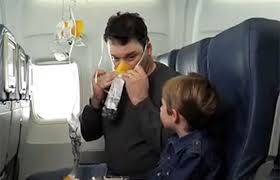Put on Your Mask First
 So much of leadership development these days focuses on what the leader does for other people. One big thing missing, in my opinion, is what the leader needs to do for him or herself first. Put on their mask first!
So much of leadership development these days focuses on what the leader does for other people. One big thing missing, in my opinion, is what the leader needs to do for him or herself first. Put on their mask first!
If you fly regularly you likely know the flight attendant’s speech as well as they do. I used to laugh at the part where the flight attendant would tell you “and if you are flying with a child, please put on your mask first and then help your child with theirs.” I understood the “why” but reasoned to myself that it would likely be a cold day in somewhere south of here before a mother would actually follow that direction. Then on a Southwest flight, I encountered one of the flight attendants that enjoyed adding flavor to her speech and she said “and parent’s if you really love that child, put your mask on first, if not, then feel free to go ahead and try to put theirs on first and let me know how that works out for both of you.” At first I thought that was kind of callous, but as I thought more about it during the flight I realized that there was an essential truth in her statement that applied not only to the mask but also to our lives.
Instructions for Putting on Your Mask
As a leader you owe it to your employees to put your mask on first. Leaders have to take care of themselves or they have less or worse yet, nothing to offer/give to their employees. Your employees need you to help them succeed, but if you aren’t at your best you limit not only yourself, but them as well. When I speak of “putting on your mask first”, I am talking about three areas of your personal and professional life:
1) Emotional – a leader has to have a strong emotional base. That doesn’t mean they can’t cry or have emotions, it means they are aware of their emotions and that they constantly work to understand them. It also means that they have a level of underlying confidence that is not dependent on what others think but is instead grounded in what they know about themselves. Many would call this a type of “maturity.” That emotional base also allows for in the moment awareness so that the leader doesn’t allow emotions to cloud judgment!
2) Spiritual – this has nothing to do with religion, it has to do with core beliefs. The essence of who we are as individuals is only found within our spiritual selves. In many ways our spiritual selves come from where we derive our self-concept. This aspect of “us” is the part that drives our awareness of self and of others, it is also the aspect that helps us to have and give hope to others. Spiritual healthiness requires us to live in line with our beliefs and the directional compass within us.
3) Physiological – the physiological health of a leader involves the physical and mental elements of our body. When our physical health deteriorates, it can and often does have an impact on the other elements as well as those you are leading. Our physiological selves have to be strong as it is the hardest to repair once it’s been damaged. My point about our physiological selves is that we only have one body and its not just the big things we do to it or with it, but also the small things, we have to pay attention to its signals and heed its warnings!
Why?
Each of these plays a critical role in the healthiness of our being. Note I used the word “being” and not “body”. Our being is our whole self – spirit, mind and body. Those three components working in symphony are what make us great or what greatly reduces our ability for accessing our potential. The first thing folks usually think or say when I bring up this topic is “oh, here we go again with that life balance stuff.” That could not be farther from the truth. There is no such thing as balancing those three areas because each requires fullness and their own level of health. They are separate and distinct. Where we may bring balance in is in how we achieve health in those three areas.
Conclusion
The purpose of my post today, however, is not to talk about each of those in-depth (that may come later). No, today’s purpose is to help you understand that you are not an effective leader for others (by the way, that is why you lead, for the benefit of others) if you can’t bring your best you to work, home, church or wherever someone needs you.
This goes without saying, but I’ll say it anyway, the number one killer of our physiological selves is stress. The best leaders learn how to use and control stress by working on all three of the elements described above! That topic is worthy of a totally separate post and I may try to bring in an old friend with much more experience and training in that area! Until then, the next time you hear that flight attendant give his or her speech, realize that they are not speaking specifically to the flight you are on, but also in life, so “put on your mask first!” Good luck!

